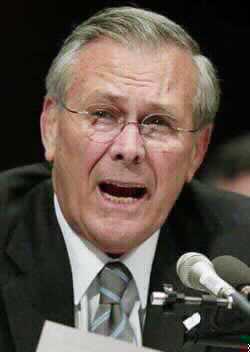HIGHLIGHTS: Commander of US Troops in the Gulf Says Ready to Move on Iraq Whenever Ordered to Do So||Russia Reiterates Support for Early Return of UN Inspectors to Iraq & Blix Says Advance Team Could Arrive in Baghdad by Mid-October||Schroeder Reiterates Opposition to War Threats against Iraq & Apologizes for Hitler Jibe by One of his Ministers|| STORY: Iraq ruled out additional conditions on UN arms inspections, prompting US Defense Secretary Donald Rumsfeld to dismiss the move as another attempt to "jerk the United Nations around."
Baghdad's rejection of any new UN resolutions on weapons inspections was seen as a new challenge to US calls for tougher measures against Iraq, as the commander of US forces in the Gulf said his troops were ready "to do whatever we are asked to do."
An Iraqi government spokesman said Baghdad opposed extra conditions following "press reports that US officials are trying to get the Security Council to issue new, bad resolutions."
Rumsfeld told CNN he wasn't "surprised" at the development.
"Anyone who has watched the past decade has seen the Iraqi government defy some 16 UN resolutions and change their position depending on what they thought was tactically advantageous to them."
Iraq on Monday told UN Secretary General Kofi Annan it would accept the unconditional return of UN arms inspectors after a hiatus of nearly four years.
The offer, however, implied a contingency that all UN sanctions imposed on Iraq after the 1991 Gulf War would be lifted.
Washington -- which has long threatened a military strike to topple President Saddam Hussein -- is pushing for a tough new Security Council resolution that would include a military option should Saddam renege.
But Baghdad made clear Saturday it would not agree to any new resolutions on the inspections.
Iraqi Deputy Prime Minister Tareq Aziz said earlier in the week he had "received information ... on attempts to make the inspectors act in a manner that would provoke Iraq and cause crises like that of December 1998," when Iraq came under a US-British bombing blitz for allegedly failing to cooperate with the arms experts.
Meanwhile Moscow reiterated its support for the return of weapons inspectors to Iraq as soon as possible.
Russian Defence Minister Sergei Ivanov said inspectors could return by early October, as soon as negotiations between Baghdad and the United Nations take place in Vienna.
"It is not a question of if (the inspectors) can or cannot return to Iraq, but how many and what sites (they can visit)," Ivanov said. "But the final decision on the date of their return rests with the Security Council."
"These negotiations in Vienna will only last a few days and from the start of October we can expect to see the first groups of international inspectors in Iraq," Ivanov said in Lisbon after meeting US President George Bush in Washington on Friday.
Chief UN arms inspector Hans Blix has said he hopes to send an advance team of UN inspectors to Iraq on October 15.
Blix "is going to have very concrete negotiations with the Iraqi authorities about the timetable," said Ivanov.
In neighboring Kuwait, US Third Army Commander General Tommy Franks said the 10,000 US troops based in the tiny Gulf state were poised for action.
"We are prepared to do whatever we are asked to do," he told reporters.
The headquarters of the US Third Army -- with troops in North Africa, the Middle East and Central Asia -- was moved to Kuwait last year.
Franks said US forces had recently raised their level of activity in Kuwait. But he stressed: "Our president has not made a decision to go to war.
"The only course of action that is not available to us is to continue the course of action we've seen over the last 11 years, where we have seen UN Security Council resolutions, one after the other, defied and flouted, while we have seen Saddam Hussein continue ... to develop weapons of mass destruction, to support terrorism, to oppress his own people," said Franks.
Meanwhile, German Chancellor Gerhard Schroeder, facing key national elections on Sunday, reaffirmed his stand against US policy on making Iraq toe the line.
"The Middle East, including Iraq, needs a lot of peace, not a new war," he told a campaign rally on Saturday.
Schroeder, the first major western US ally to rule out his country's participation in an attack on Iraq, said the chance to send UN weapons inspectors back to Iraq should be seized upon.
On Friday, White House national security advisor Condoleezza Rice accused Bonn of having soured US-German relations due to Schroeder's lack of support for Washington, and also because of an alleged Hitler jibe from one of his ministers at Bush.
PHOTO CAPTION
Secretary of Defense Donald Rumsfeld testifies before the Senate Armed Services Committee hearing on Capitol Hill in Washington, September 19, 2002. American air power alone could not wipe out Iraq's secretive and deeply buried arms programs and any U.S. attack to do so would require ground troops, Rumsfeld told Congress. Photo by Hyungwon Kang/Reuters
- Sep 19 4:51 PM ET
- Author:
& News Agencies - Section:
WORLD HEADLINES


 Home
Home Discover Islam
Discover Islam Quran Recitations
Quran Recitations Lectures
Lectures
 Fatwa
Fatwa Articles
Articles Fiqh
Fiqh E-Books
E-Books Boys & Girls
Boys & Girls  Women
Women










